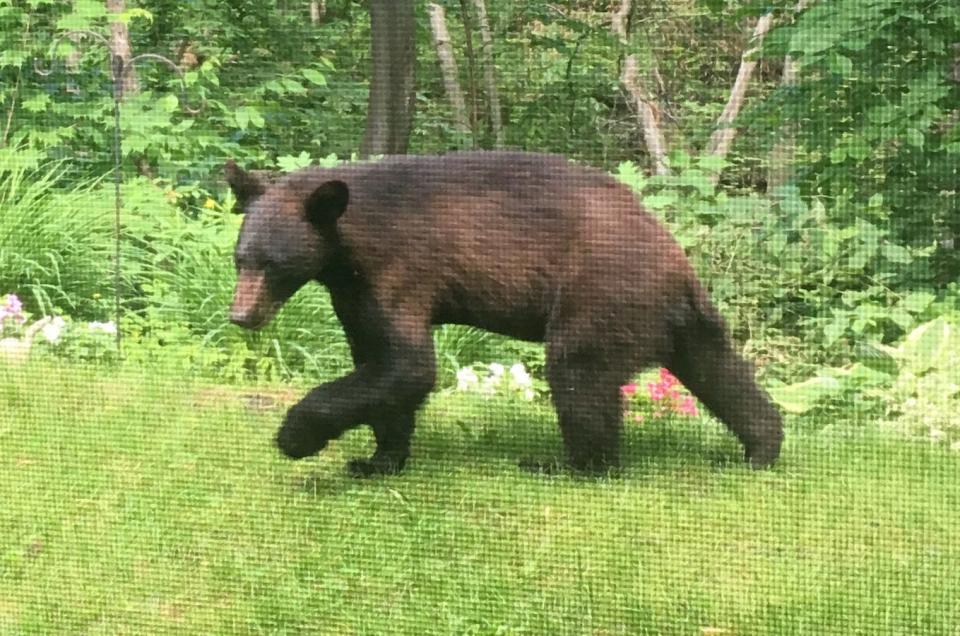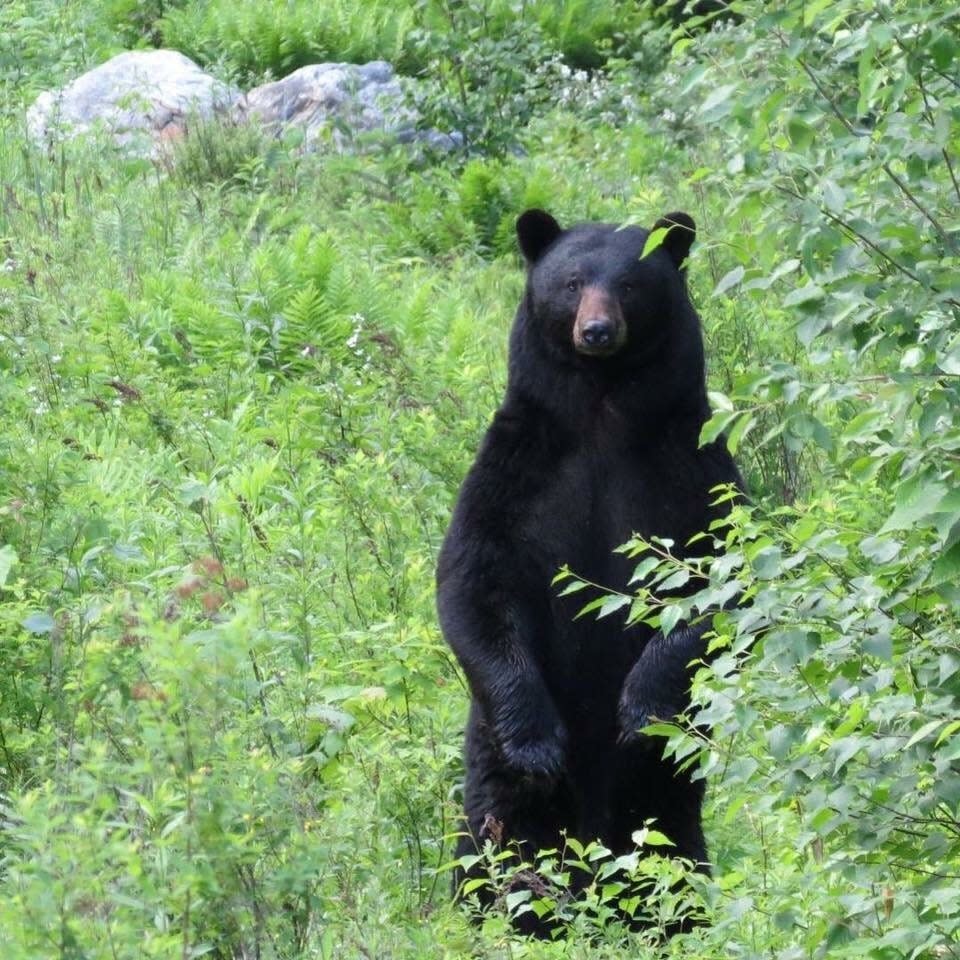A Vermont state game warden had to kill an aggressive black bear in Underhill last Friday, May 24, at about 6:30 in the morning after the bear adopted a “predatory stance” with its head lowered, and began to approach and circle the warden.
In an interview with the Burlington Free Press, Jaclyn Comeau, black bear project leader for the Vermont Department of Fish & Wildlife, said the behavior displayed by the Underhill bear is “exceptionally rare.” She said the bear only weighed about 100 pounds and is likely to be one or two years old. Its exact age has yet to be determined.

“A big red flag is what bear biologists classify as predatory-style behavior,” Comeau said. “This bear checked all those boxes.”
Comeau explained the bear was circling, following and approaching the warden not in a defensive way, like it needed to protect itself or a food source, but in a way where it was testing out whether or not the warden “might actually be a food source.”
“That’s almost never happened and it’s a nuanced behavior to tease out,” Comeau said. “We get a lot of reports from Vermonters who step outside and (encounter) a bear (that) starts taking bounding motions, huffing and jaw popping. To the person it’s very scary, but we understand those are behaviors we consider (to be) defensive. The bear is afraid, and is trying to tell you to back off.”
Young age might be a factor in the ‘exceptionally rare’ behavior exhibited by Underhill bear
In her 10 years in Vermont, Comeau said she couldn’t think of another instance when a bear was euthanized for the behavior exhibited by the bear in Underhill. She said the bear’s age might be a factor.


“One rule of thumb is younger bears are still figuring things out and seem to be the ones that engage in this behavior,” she said. “Most people are really afraid of big, mature male bears that weigh 250 to 300 pounds. Those bears are pretty successful at getting food. They, for whatever reason, don’t engage in those types of behaviors.”
The Underhill bear had been getting into trouble for weeks, with several landowners in the area reporting aggressive behavior. On the morning it was killed, the bear was attracted into a resident’s yard by recycling left outside the front door. The bear repeatedly returned to the yard after initially being scared away at about 5:15 a.m., despite the fact that the homeowner removed the recycling and no other unsecured food sources were present. After returning, the bear showed no fear of people and acted aggressively, according to a news release.
“No one wants bear conflicts to escalate to the point that killing the bear is necessary to protect public safety,” Game Warden Lt. Robert Currier said in a statement. “Vermonters have a responsibility to stop these kinds of conflicts before they escalate by making sure bears are not attracted to our homes by easy access to foods like unsecured garbage, birdfeeders, or unprotected backyard chickens and bees.”
Bears are emerging from their dens earlier because of climate change, shorter winters
The Vermont Fish and Wildlife Department warned the public in early March that bears were coming out of their dens earlier than usual, and urged people to take steps to prevent conflicts. Shorter winters mean bears are emerging from their dens about two weeks earlier than what used to be thought of as the beginning of bear season in northern New England.
“Vermonters need to act to prevent conflicts now, even if they have never had a bear visit their property before,” Comeau said in a statement in March. “Mid-March is the time for Vermonters to take down our birdfeeders, make sure our garbage is secure and protect our backyard chickens and bees with an electric fence. This helps teach bears that our yards and neighborhoods are not good places to search for food. But, it will only work if everyone does their part.”
Bears are being pushed by development into smaller and smaller areas
Jeremy Schmid, a Vermont game warden whose patrol district includes Underhill, spoke to the Burlington Free Press about the bear problem on May 20 in an interview in Jeffersonville. Schmid said he has had to euthanize several aggressive bears during his nine years as a warden. He said a generation of Vermont bears have grown up in residential areas, foraging through trash in dumpsters.


“If you have a two-, three- or even four-year old bear raised by its mother foraging around on garbage that’s kind of all they know how to do,” Schmid said. “Foraging for natural foods is what we want, but at the end of the day, if these bears have been accustomed to going from trash can to trash can, or bird feeder to bird feeder, they’re not going to go forage and look for food when they know where the easy food sources are. They’re opportunists.”
Comeau concurred.
“To Jeremy’s point, these are long-lived, smart animals,” Comeau said. “They’re learning, always trying to figure out how to get the next, best meal. Cubs are learning from their mothers and building off life experiences. It does create, like Jeremy says, this generation of bears that have figured out human food sources are easy to access. There’s a lot of calories and they’re predictably there, day in and day out, no matter the weather or time or year.”
Schmid also said we’re pushing bears, and all wildlife, into smaller and smaller sections of forest land.


“Any time we have a housing development or new neighborhood brought in we’re pushing wildlife to smaller areas, especially in the Chittenden area, parts of Franklin County and even parts of Lamoille County,” he said. “As we build infrastructure, wildlife are slowly losing their habitat. That’s why we see bears going through Essex and Williston, Fairfax and Jericho. These areas where you look back 20 years and how much wilderness and forest land there was and now it’s all houses and businesses and commercial property.”
Underhill bear wasn’t the first bear this year Fish and Wildlife deemed dangerous
Comeau said the Underhill bear wasn’t the first this year to get in serious trouble.
“We have attempted to euthanize a couple of bears this year already, but haven’t been successful,” she said. “We aren’t always able to catch them. We’ve been dealing with a number of home entries around the state already and we’re not even into June yet.”
Comeau encouraged everyone to consult Fish and Wildlife’s guidelines for living with bears.
“If you live in a neighborhood where bears are seen you got to get at the root of the problem, the food that’s drawing bears in, that’s the priority,” Comeau said.
Contact Dan D’Ambrosio at 660-1841 or [email protected]. Follow him on X @DanDambrosioVT.
This article originally appeared on Burlington Free Press: An aggressive bear in Underhill was killed after approaching warden
Source Agencies


